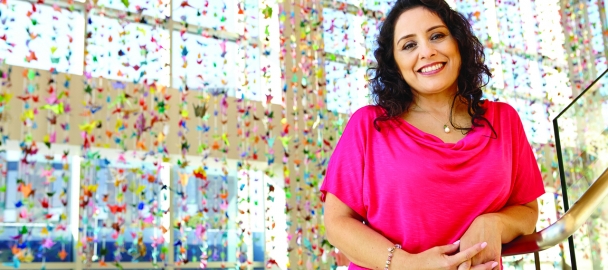
In the spring of 2005 Ingrid Bolanos, 36, was living her life as she normally did. Her two daughters Lindsey and Nicole, 8 and 3 at the time, were growing up right before her eyes. She loved to spend quality time with them and her husband Ernie. Working at Long Beach Medical Center as an administrative secretary Ingrid was familiar with the medical field and never thought twice about being sick. That all changed one day when Ingrid decided to do a breast self-exam in the shower.
It was a day like any other for Ingrid. She was going through her normal routine and while in the shower she examined her breasts for lumps on a whim. While doing so she discovered a strange lump and recorded it in her memory.
“At first I didn’t think much of it,” says Ingrid. “There had never been any history of cancer in my family, so l just went about my day as usual and kept the lump in the back of my mind.”
A month went by and Ingrid chose to reexamine herself. When she did she discovered that the lump was still there.
Ingrid's Cancer Journey
Ingrid went in for a check-up and her physician was able to locate the lump without any direction. An immediate referral to the MemorialCare Breast Center was made to her and Ingrid was off to have her first ever mammogram, followed by an ultrasound and a core needle biopsy (CNB). After leaving the office Ingrid still felt confident that she did not have breast cancer due to her family’s great medical history and her age. Three days later she got a call and Ingrid learned that her test came back positive for breast cancer.
As is the case with most cancer patients, Ingrid was devastated when she heard the news. Thinking about her daughters’ lives without her was tearing her up inside and she wanted to make sure she did everything to fight for her well-being. Upon further testing it was determined that her cancer had not spread to the lymph nodes, and she had a great chance for survival. Ingrid was officially diagnosed with early Stage 1 - Invasive Ductal Carcinoma.
Invasive ductal carcinoma (IDC), sometimes called infiltrating ductal carcinoma, is the most common type of breast cancer, which affects about 80 percent of all women diagnosed with breast cancer. Its name refers to cancer that has broken through the wall of the milk duct and has begun to invade the tissues of the breast. Over time, IDC can spread to the lymph nodes and possibly to other areas of the body.
For the next four months Ingrid underwent aggressive chemotherapy and managed to keep her life in order. “The only issue I had to deal with during my treatment was the hair loss,” says Ingrid. “I was never sick to my stomach or had any other reactions to the treatment, but it did make me tired at times. Regardless, I was still able to continue working full-time and my life pretty much stayed the same as it was before my diagnosis.”
After the chemotherapy was over, Ingrid underwent a lumpectomy performed by Tomi Evans, MD, general surgeon, Long Beach Medical Center. The results of the lumpectomy showed a “complete pathologic response,” meaning there was a total absence of any residual tumor cells. Ingrid was now cancer-free.
The final phase of treatment involved six weeks of radiation therapy to prevent tumor recurrence after surgery, which was administered by Alam Nisar M. Syed, MD, medical director, radiation oncology & endocurietherapy, MemorialCare Todd Cancer Institute, Long Beach Medical Center. “I couldn’t be any happier with the outcome of my treatment,” says Ingrid.
Advocate for Breast Health
Cancer free since 2005, Ingrid is now an advocate for breast self-exams and always stresses the importance of early detection to others. In an effort to give back and make an impact on others, Ingrid has chosen to volunteer with the MemorialCare Breast Center’s Women Guiding Women: Cancer Support and Education program. The program pairs newly diagnosed women with cancer survivors who have gone through similar experiences and times in their lives. She can now mentor other women on how to care for themselves and what they can expect in the months to come.
Ingrid is able to work closely with Spanish speaking women because she is bilingual. She helps them to understand what they are going through and utilizes her knowledge of cultural differences to enhance her mentor abilities.
“I get to help women who need it the most, through a very difficult time in their lives,” says Ingrid. “My advice to women is to be their own advocate, practice monthly breast exams, educate themselves on the risks and always follow through with their annual mammograms. Everyone should be aware that cancer does not discriminate, ever.” 2017.